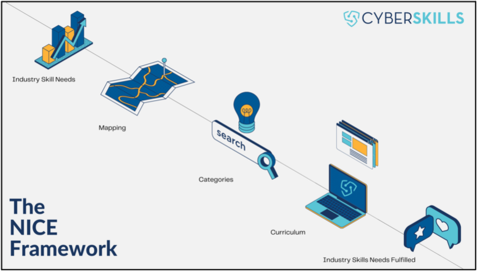NICE Framework Success Story: Cyber Skills Curricula
08 Dec, 2022
Min read

Organisation Framework
Cyber Skills is a collaborative initiative between four of Ireland’s leading universities, creating highly focused cyber security pathways. Led by the Chair of Cybersecurity at Munster Technological University (MTU), Dr. Donna O’Shea, in close collaboration with leading academics from University of Limerick (UL), Technological University Dublin (TU Dublin), and University College Dublin (UCD), Cyber Skills leverages the expertise they bring in a range of cybersecurity areas to provide relevant workplace skills. Cyber Skills has also partnered with the Commonwealth Cyber Initiative (CCI) at Virginia Tech, a global center of excellence in security, to build on international experience in solving the global skills shortages. Cyber Skills aims to:
- Create Innovative, Enterprise focused and Research informed cybersecurity courses
- Empower Learner to design their own education pathway
- Facilitate new learning pathways using micro credentials
By working closely with industry to gain insight into the needs of the workplace, Cyber Skills courses have been designed to provide relevant cybersecurity skills for the career-focused professional. The Cyber Skills initiative is funded through the Higher Education Authority (HEA) of Ireland Human Capital Initiative Pillar 3.
Tie-In with NICE Framework
The NICE Framework provides a common language that enabled us to easily translate our educational content to workplace skills needs.
The Knowledge, Skill, and Ability (KSA) statements are clearly understood by industry partners, allowing prerequisite knowledge to be easily identified and highlighting requirements for inclusion in learning outcomes. By leveraging the NICE Framework, developing targeted pathways to support the needs of industry was both quicker and simpler.
We also used the NICE Framework to align our courses with specific Work Roles, enabling greater understanding by both employers and students of the specific skills that are gained through a course or module, along with the most suitable job role for those skills.
Drivers
Cyber Skills was formed in a response to a need to address the Irish and worldwide cybersecurity skills gaps. Doing so would need an approach that:
- Makes cybersecurity education more accessible to working IT professionals
- Provides clear alignment between course offerings and workplace roles
- Produces clearly identifiable upskilling pathways
- Is flexible to allow learners to create individualized cybersecurity education pathways
Process
In order to achieve those objectives, Cyber Skills first engaged industry representatives to identify specific cybersecurity skills gaps within their organizations and then used that information to:
- Identify relevant NICE Framework Work Role(s) for the needed skills
- Map skills to appropriate Knowledge, Skill and/ or Ability (KSA) statements – at times, multiple KSAs were mapped to a specific skill need
- Assign an appropriate topic for each of the mapped KSAs — e.g., software development, network systems, risk management, standards — which then serve as easily identifiable modules in a learning pathway
- Use the Knowledge and Ability statements to define learning outcomes for a module, and Skill statements as input to define the assessments
Benefits and Impact
The availability of the NICE Framework has supported us in the successful implementation of Work Role-specific pathways in Secure Network Operations, Secure Software Development, and Secure Systems Architecture.
These pathways were developed based on industry requirements derived by using the NICEFramework to provide specific skills required in the workplace. Using this approach means we can:
- Clearly identify Work Role(s) applicable for a specific pathway
- Design topic-specific modules for more specific upskilling
- Expedite the provision of new programs through the use of the topic-specific modules
“Dell Technologies is delighted to work in partnership with the Cyber Skills team. What is unique about this project is that we were able to develop cybersecurity pathways aligned to job roles we identified as critically important to our organisation... and we were able to develop these pathways with real cybersecurity experts across different universities such as MTU, UL, TUD and UCD.”
-Bob Savage, VP Regional CIO for EMEA and Cork Site Leader, Dell Technologies
Next Steps
At Cyber Skills, we will be working to expand our provision by targeting further NICE Framework Work Roles. As part of those efforts, we aim to create a database of mappings to specific learning outcomes, further enabling students to create unique pathways that support their specific career goals.


.jpg)
